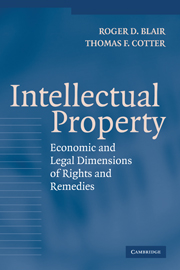Book contents
- Frontmatter
- Contents
- Acknowledgments
- 1 Introduction
- 2 The Law and Economics of IPRs
- 3 A General Theory of Damages Rules
- 4 Departures from the General Theory
- 5 Liability Standards for IPRs
- 6 Who Is an Infringer?
- 7 Who Should Be Entitled to Sue for Infringement?
- 8 Calculating Monetary Damages
- 9 Concluding Remarks
- Bibliography
- Index
8 - Calculating Monetary Damages
Published online by Cambridge University Press: 08 January 2010
- Frontmatter
- Contents
- Acknowledgments
- 1 Introduction
- 2 The Law and Economics of IPRs
- 3 A General Theory of Damages Rules
- 4 Departures from the General Theory
- 5 Liability Standards for IPRs
- 6 Who Is an Infringer?
- 7 Who Should Be Entitled to Sue for Infringement?
- 8 Calculating Monetary Damages
- 9 Concluding Remarks
- Bibliography
- Index
Summary
We return in this penultimate chapter to the question of damages. To put this chapter in context, we proposed in Chapter 3 a general rule under which the IPR owner is entitled to recover from the infringer the greater of her lost profit or the defendant's profit attributable to the infringement, subject to adjustment up or down to avoid over – and underdeterrence. In Chapter 4, we considered whether further refinements to the model are necessary or at least justifiable when more specific consideration of the nature of patents, copyrights, and trademarks is brought to bear. We then took up, in Chapters 5, 6, and 7 some related issues concerning the standard of liability and identifying the proper defendants and plaintiffs. We now return to the damages question, focusing on the more concrete issue of how damages should be calculated. Our principal concern will be the calculation of compensatory damages – lost profits or reasonable royalties – in patent cases, although much of our analysis could be applied to calculating restitutionary damages as well. It also could be extended to trade secrets, copyrights, and trademarks. In general, however, the case law on damages calculation in these bodies of law is much less developed than in patent law. In copyright, this may be due in part to the availability (in the United States) of statutory damages, and perhaps to the lower stakes at issue in the average case (in comparison with patent law).
- Type
- Chapter
- Information
- Intellectual PropertyEconomic and Legal Dimensions of Rights and Remedies, pp. 208 - 262Publisher: Cambridge University PressPrint publication year: 2005



